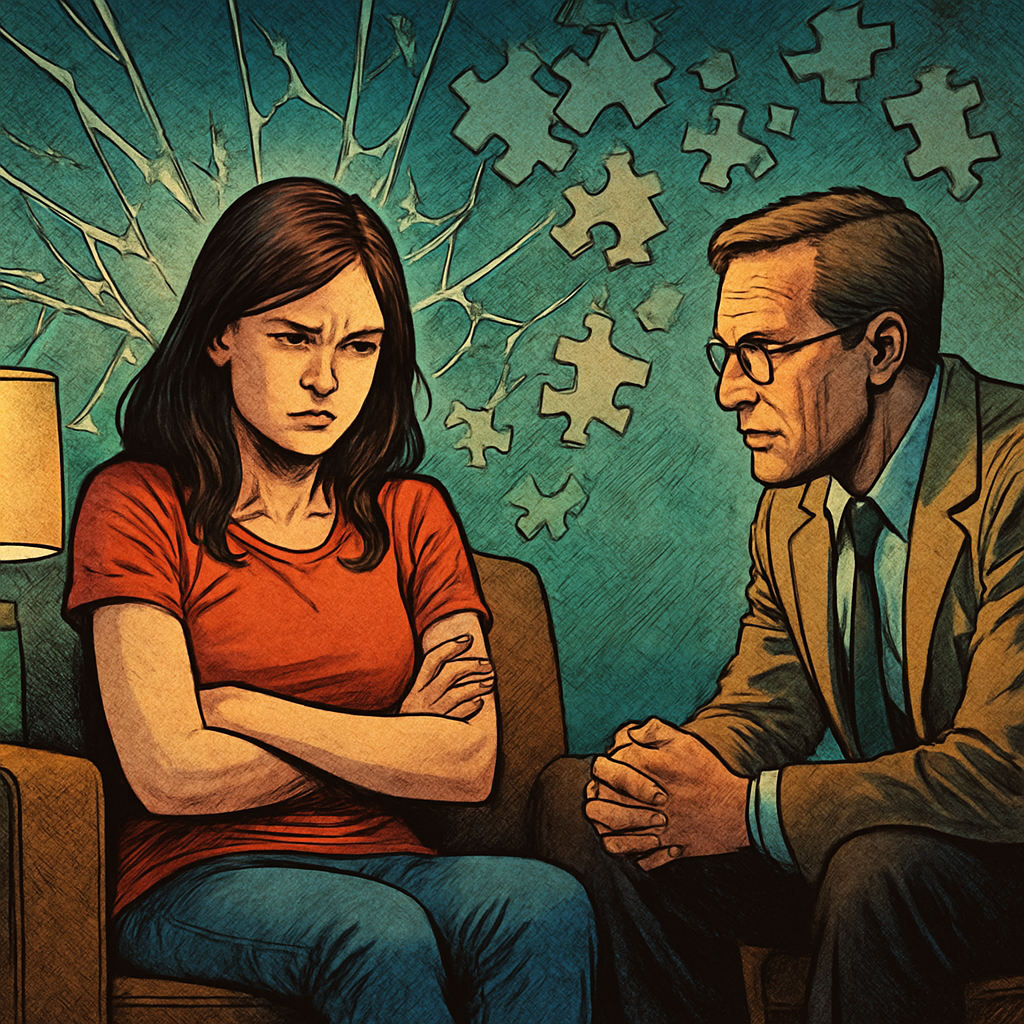I still remember Amanda because she reminded me of how the smallest moments contain earthquakes. 🌪️ She arrived at my office in a hurricane of contradictions – outwardly composed in her tailored blazer and confident stride, yet the slight tremble in her voice betrayed the woman who’d spent the previous night crying in her bathroom so her husband wouldn’t hear.
“My husband forgot my birthday. Completely. Not even a text,” she said, laughing as if it were absurd, but her eyes remained fixed on her wedding ring, twisting it nervously. “And the worst part? I’m not even surprised. I’m just… embarrassed that I hoped for something different.”
What struck me wasn’t the forgotten birthday – those surface-level disappointments happen in every relationship. It was the intricate emotional choreography Amanda performed around it: the midnight countdown to confirm the oversight was real, the elaborate fantasy about a surprise vacation, the calculated internal debate about how to respond without seeming “dramatic.” All while her husband remained blissfully unaware of the emotional gymnastics his partner performed daily.
🎭 The Invisible Labor of Hoping
Relationships that should bring comfort often become elaborate exercises in expectation management. Amanda spent more energy constructing rationalizations for her husband’s behavior than he spent thinking about her birthday. This imbalance isn’t accidental – it’s the predictable outcome when one person carries the emotional responsibilities for two.
The forgotten birthday wasn’t the problem. It was merely the latest evidence in a case Amanda had been building for years but couldn’t bring herself to prosecute. Her emotional frame – the invisible lens through which she interpreted their relationship – had been constructed to preserve the marriage at all costs, even as evidence mounted that something fundamental was broken.
“I keep thinking about my options,” she confessed, “express my hurt and risk being called oversensitive, or say nothing and swallow this resentment with all the rest. Neither feels right.”
Of course neither feels right. When your choices are self-betrayal or conflict with someone who’s demonstrated emotional unavailability, you’re selecting between different flavors of the same poison. ☠️
📉 The Mathematics of Diminishing Expectations
During our sessions, Amanda revealed the subtle calculus of her marriage – how she’d learned to ask for less to avoid disappointment, how gratitude for the bare minimum had become her default emotion, how she’d constructed an elaborate framework to justify emotional neglect as “just how men are.”
Ever notice how we develop the most sophisticated psychological theories to explain away the simplest truth? That when someone consistently fails to meet your emotional needs, it’s not because they can’t – it’s because they’ve learned they don’t have to.
Amanda had unknowingly created a relationship script where her husband’s emotional disengagement was the expected norm. Each time she accommodated his passive-aggressive behavior or excused his emotional absence, she reinforced this pattern.
Here’s what happens when emotional neglect becomes your normal:
- You develop an advanced degree in mind-reading and fortune-telling 🔮
- Your standards become so low they require excavation equipment to locate
- You become fluent in self-gaslighting (“Maybe I’m overreacting”)
- The gap between what you want and what you expect becomes the Grand Canyon
- Your emotional needs start feeling like unreasonable demands
🎂 The Birthday That Broke the Spell
Sometimes it takes something seemingly trivial to illuminate what we’ve normalized. Amanda’s birthday wasn’t significant because turning 41 matters particularly – it mattered because it crystallized a pattern her body had recognized long before her mind caught up.
The physical sensations that flooded Amanda whenever she contemplated confronting her husband – the tightness in her chest, the knot in her stomach – weren’t random. These emotional bytes contained crucial information about her needs for acknowledgment and appreciation that had gone unmet for years. Her body was keeping the score her mind refused to calculate.
“I don’t know why this birthday hit differently,” she admitted during our third session. “But something inside me just… shattered when midnight came and went.”
I do. That something was the fragile architecture of rationalization she’d spent fourteen years constructing. The birthday merely provided the final tremor that collapsed the structure.
When Amanda finally confronted her husband, his response was predictably defensive, followed by a reluctant apology and flowers purchased from the gas station. But something had fundamentally changed – not in him, but in her perception. The emotional frame through which she viewed their relationship had shifted, allowing her to see patterns that had been invisible before.
The true work wasn’t about salvaging that particular birthday or extracting the perfect apology. It was about Amanda developing the emotional granularity to distinguish between disappointment (a single missed occasion) and devaluation (a consistent pattern of emotional neglect). Between sadness (a temporary emotional state) and diminishment (the gradual erosion of her sense of worth).
I think about Amanda sometimes when I pass the coffee shop where we occasionally met after her formal therapy ended. Last I heard, she was celebrating her birthday in Paris – alone. ✈️ The trip she’d always wanted but had been told was “impractical.” Sometimes the most profound act of self-care isn’t finding someone who remembers your birthday – it’s remembering yourself.
💡 Core Insight
The greatest myth in relationships isn’t that someone will complete you – it’s that someone should have to.
— Lola Adams, noting that what we call “settling” in relationships is often just surrendering to the gravity of our deepest fears
https://scholarworks.umt.edu/cgi/viewcontent.cgi?article=12275&context=etd
https://scholarworks.smith.edu/cgi/viewcontent.cgi?article=1698&context=theses
https://pmc.ncbi.nlm.nih.gov/articles/PMC3876290/
https://pmc.ncbi.nlm.nih.gov/articles/PMC7683637/
https://psychcentral.com/health/effects-of-emotional-abuse
https://www.frontiersin.org/journals/psychology/articles/10.3389/fpsyg.2022.966702/full
https://www.ebsco.com/research-starters/health-and-medicine/emotional-abuse
https://www.womenslaw.org/about-abuse/forms-abuse/emotional-and-psychological-abuse

